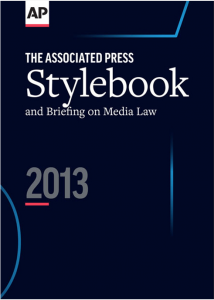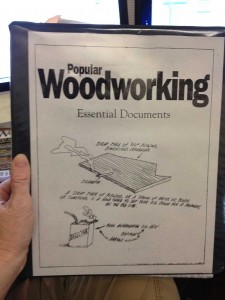We may receive a commission when you use our affiliate links. However, this does not impact our recommendations.
 Nope – this isn’t about woodworking or a woodworking book. The only lignum involved has been chipped, pulped, bleached, beaten, pressed and printed. Stop reading now if that offends you.
Nope – this isn’t about woodworking or a woodworking book. The only lignum involved has been chipped, pulped, bleached, beaten, pressed and printed. Stop reading now if that offends you.
Today, the second-most consulted book in our office marks it’s 60th anniversary with the release of the 2013 edtion of “The Associated Press Stylebook.” I have ordered two copies – one for me (because without a new one every year since 1986, I’d feel bereft) and one for Glen Huey, because as managing editor (note that the title follows his name and is not capitalized), he’s the official copy editor on our staff.
The AP Stylebook (as it’s commonly called) is the style and usage bible for many newspapers and magazines, though there are also many publications that swear by “The Chicago Manual of Style” (visit the Onion to read about gang violence on the subject). The most widely used academic style guides are likely those of the Modern Language Association (MLA) and American Psychological Association (APA) – though there are a number of style guides specific to interest areas and professions.
Should you care? Perhaps not – but you’d likely notice if we eschewed specific style choices; every issue would be a mishmash…or is it “mish mash” or “mish mosh”*… of different stylistic approaches to what is basically the same word or phrase (including such important decisions as: is it “donut,” “doughnut” or “dinner?”).
The first-most consulted book in our office is the Popular Woodworking stylebook, which covers words and usages specific to woodworking, but also incorporates our collective linguistic predilections – e.g. “moulding,” “band saw” and “handsaw” rather than “molding,” “bandsaw” and “hand saw,” as well as “web site” and “e-mail” – departures from the AP stylebook, which states “website and email.”
Then there’s the “understood” but unwritten style – such as Chris’ eschewal of the word “of” after “couple.” (And yes, a few of you have noticed that “couple of” is once again standard in our pages…except in Chris’ articles.)
And now, I want a doughnut.
*I’d have to go the official dictionary – “Webster’s New World College Dictionary” – for that one; it’s not covered by either the AP or the PW stylebooks.
p.s. To any logophiles among you, I recommend the books “Made in America: An Informal History of the English Language in the United States” and “The Mother Tongue: English and How It Got That Way” both by my favorite living non-fiction author, Bill Bryson. I’m also eagerly awaiting the new book from my favorite curmudgeonly copy editor, Bill Walsh, “Yes, I Could Care Less,” which is due out on June 18, 2013.
p.p.s. No doubt there are many copy editing errors in the above – but let’s consider them “style choices.” Some of them are.
Here are some supplies and tools we find essential in our everyday work around the shop. We may receive a commission from sales referred by our links; however, we have carefully selected these products for their usefulness and quality.









Megan, I enjoyed your post. I am currently reading Yahoo’s style guide. It has been a good read and written for blog writers, which I like.
Take care
AL
http://www.woodworkingwithajo.com
Hi Megan,
Some guidance, please. Are you a craftsman? Should a woodworker keep his tools sharp? I tend to use workarounds but sometimes these, too, are awkward. I have not warmed up to craftspeople, but should I?
Just a couple of examples. Thanks.
Rob
Please, is there a rule on paralepsis – “not to mention X” and “to say nothing of the X”?
If I know chuck bender , he will have some comments on the subject. Thanks for the piece .
Elmer
Do any of these style books cover the often abused “their” referring to a singular actor to be politically correct rather than use “he” or “he or she”?
Megan, I don’t write anywhere near as much these days as I did in the past, but I maintain a keen interest in words and language. For readers interested in language I highly recommend “The Careful Writer” by Theodore M. Bernstein. This has always been my go-to book when wrestling with concepts such as “composed of” vs. “comprised of.,”
As John Ciardi used to say at the end of his NPR radio spot… Good Words To You.
Steve
I want a couple donuts.
Does the style guide take a position on a starting sentences with “To be sure”?
Megan, I don’t know if you’re familiar with ‘The stories of English’ by David Crystal? I quite like it.